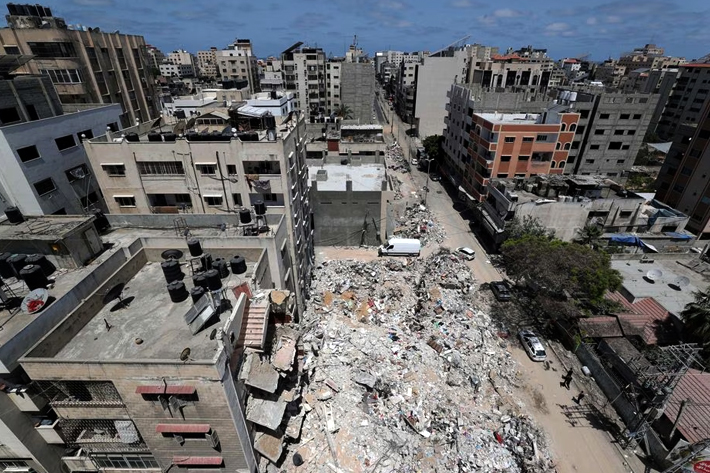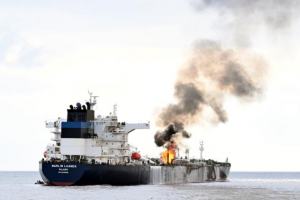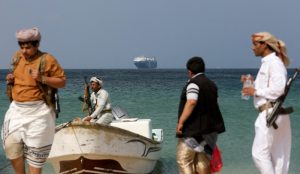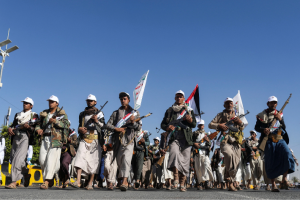An escalating conflict between Israel and Palestinian militant group Hamas is piling up risks for Asia, threatening geopolitical tensions in the region and weakening investors’ risk sentiment.
The conflict began on Saturday, when Hamas launched a brutal assault on the Middle East’s most powerful army, using bulldozers, hang gliders and motorbikes.
On Sunday, Israel vowed “mighty vengeance” against the attacks, which left more than 1,000 people dead, and Hamas gunmen holding hundreds more captive.
Also on AF: China’s New Nuclear Submarines Seen as Tougher to Detect
“This is our 9/11,” Major Nir Dinar, spokesperson for the Israeli Defence Forces, said. “They got us.”
Hamas’ attack, seen as the worst breach in Israel’s defences since Arab armies waged war in 1973, and a major intelligence failure, has also harmed dozens of nationals from across the world, including the US, France, Nepal and Thailand.
Several Americans were killed by Hamas attackers, a White House National Security Council spokesperson confirmed, saying the US would continue to monitor the situation closely.
And Thailand’s foreign ministry said on Monday 12 Thai nationals had been killed in the unrest. Eleven others were kidnapped and eight injured, it added.
“We are working to help all Thai citizens in Israel,” Foreign Ministry spokesperson Kanchana Patarachoke told reporters.
Meanwhile, Nepal said at least 10 of its nationals were killed in Israel following Hamas’ attack. The country’s cabinet is set to hold an emergency meeting to discuss how to evacuate thousands of others working and studying there.
Asian leaders condemn attack
Leaders from Japan, India, Singapore, Thailand and others across the region expressed concern over the offensive by Hamas.
“Japan strongly condemns the launch of a number of rockets as well as infiltration into the Israeli territories from the Gaza Strip by Hamas and other Palestinian militants,” a statement from the Japanese foreign ministry said. “Japan urges all the parties concerned to exercise maximum restraint in order to avoid further damage and casualties.”
Indian Prime Minister Narendra Modi took to X (formally known as Twitter) to express condolences as well.
“Deeply shocked by the news of terrorist attacks in Israel. Our thoughts and prayers are with the innocent victims and their families. We stand in solidarity with Israel at this difficult hour,” Modi wrote.
Singapore’s foreign ministry also “strongly” condemned “the rocket and terror attacks from Gaza on Israel, which have resulted in deaths and injuries of many innocent civilians.” In a statement, the ministry called for “an immediate end to the violence.” There were currently no reports of any Singaporeans affected, it added.
China’s complex trade ties
China’s foreign ministry also expressed concerns on the conflict on Monday, after initially calling for calm and advocating for “the two-state solution and establishing an independent State of Palestine.”
“China opposes actions that escalate conflicts and undermine regional stability. We hope to see an early ceasefire, cessation of war and restoration of peace,” spokesperson Mao Ning said at a regular press briefing in a response to a query.
Mao’s statement came after Israel said on Sunday it expected to see a “stronger condemnation” of Hamas from China.
China has been looking to ramp up ties with Israel, amid its ongoing tech and trade war with the US, which is a key ally of the Benjamin Netanyahu government.
The Israeli Prime Minister was due to visit China this month — a trip Chinese President Xi Jinping said he was “looking forward to.”
Beijing also has close ties with Iran – which has congratulated Palestine over the Hamas attack. China is believed to have played a key role in brokering peace between Iran and Saudi Arabia at a time when the US is also pushing for the resumption of Saudi-Israel ties.
Investment group Middle East Briefing warned the complexity of these geopolitical moves poses risks to China’s trade ties with Israel and Beijing’s plans to ‘reposition Syria as a trade corridor’ between the East and the West.

Asia-Pacific currencies fall
Most Asian emerging market currencies also retreated on Monday, as the dollar strengthened on uncertainty over the conflict.
The currencies of net oil importers Indonesia and Thailand fell 0.7% and 0.4% respectively. The rupiah hit its lowest since late December, while the baht was heading for its worst day in a week.
The Thai baht has been already under pressure recently because of the policies of the new government, which has raised concern about a widening fiscal deficit from higher spending.
“With US yields still elevated and Asian exports not rising strong, this adds further to US dollar strength and potential weakness in Asian currencies in the near-term,” Michael Wan, a senior currency analyst at MUFG Bank, said.
The South Korean won depreciated 0.6%, on track for its worst day since September 26. The Singapore dollar and Malaysian ringgit also retreated 0.2% each, while the Philippine peso depreciated 0.3%.
Bucking the trend, the Chinese yuan advanced 0.2% after opening from a week-long holiday.
Investors flock to safe havens
As trading started in Asia on Monday, investors were seen flocking to safe haven assets like gold and the dollar. US Treasuries, which have been sold off aggressively, also remained in demand.
“This is a good example of why people need gold in their portfolios. It is a perfect hedge against international turmoil,” said Peter Cardillo, chief market economist at Spartan Capital Securities, who predicted that the dollar would also benefit.
“Anytime there is international turmoil, the dollar strengthens,” Cardillo said.
Analysts were focused on the impact on energy prices as they tried to assess the ripple effects. Oil prices jumped more than $4 a barrel in early Asian trade on Monday.
Israel’s war on Hamas will worsen already frail market sentiment as investors price in an expectation that US interest rates will stay higher for longer and China — the world’s second largest economy — faces multiple economic headwinds.
‘Scope of conflict’ in focus
“The events in Israel over the weekend have sparked some risk aversion in early Asian trade,” Kyle Rodda, a senior financial market analyst at Capital.com told Reuters.
“For those with open positions in the market, there could be ongoing volatility as the situation unfolds.”
The key question for markets now “is whether the conflict remains contained or spreads to involve other regions, particularly Saudi Arabia,” analysts at ANZ said, according to a CNN report.
“Initially at least, it seems markets will assume the situation will remain limited in scope, duration, and oil price consequences. But higher volatility can be expected.”
- Vishakha Saxena, with Reuters
Also read:
China’s Private Real Estate Giants Teeter Near Collapse
World Bank Says Asia Faces Worst Outlook in 50 Years – FT
China-Western Tensions Reshaping Global Business
US, Euro Firms Switch Investment Focus From China to India
























